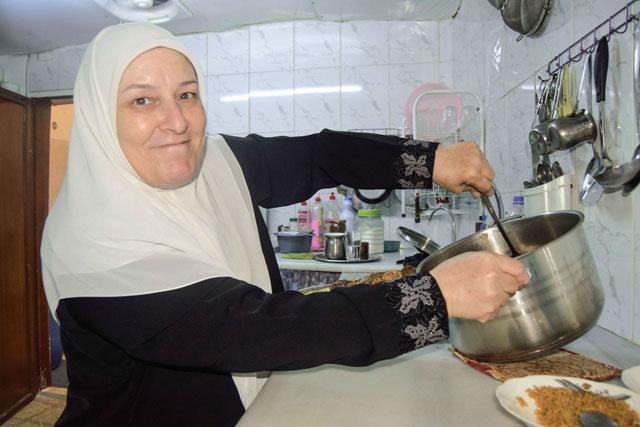By Camille Dupire
Jordan Times, Amman
WWR Article Summary (tl;dr) Maisoon Hussein is a proud business owner who wakes up every day before dawn and starts preparing her now famous “Palestinian couscous” on the floor of her Zarqa home.
AMMAN
Used to making maftool (a form of hand rolled pasta pearls made out of wheat, flour and bulgur) for her family and friends, Maisoon Hussein never imagined that this traditional Palestinian dish would become her source of income and the reason for her personal success.
Maisoon fled from Palestine during the war with no possessions or skills that qualified her to work in her newfound host country, Jordan. Her husband was sick, making her the only one able to provide for her family.
“I started making maftool to feed my children, as we had nothing else to live off,” Maisoon recalled, adding, “sometimes, I didn’t have six piasters in my pocket to buy one kilo of lentils to feed my kids.”
Today, Maisoon is a proud business owner who wakes up every day before dawn and start preparing her now famous “Palestinian couscous” on the floor of her Zarqa home.
“My journey started when I joined the ‘Home- based businesses training programme’ conducted by USAID Local Entreprise Support Project [LENS] in Zarqa. There, I learned how to upgrade the quality of my dish in order to sell it to other businesses such as restaurants and supermarkets,” Maisoon told The Jordan Times recently, stressing that “it was really the turning point from selling my product to neighbours and acquaintances to scaling it up to a much wider customer base”.
Along with 30 other women, she attended trainings in networking and various techniques related to product marketing. She also participated in food tasting and food festival events, where she got to build a client base and receive feedback to improve her business.
“Maisoon used to walk five kilometres back and forth every day, carrying heavy bags of food for the training, just to reach the training site. She never missed a day, except when her husband was hospitalised,” recalled Jeeda Samaan, one of the trainers in the programme, adding, “She had a thirst for learning and growth, and she used to apply everything she learned immediately.”
Jeeda remembered one time when USAID LENS organised a showcase for participants to present their products to the public. “She was not feeling well that day but she decided to go anyway. So she made the maftool and went to the training site. When she got there and made sure her product was displayed, she fainted. That is how much she wanted it,” the trainer said.
“All the praises I received about my dish really helped me gain confidence to establish my business. I always say that ‘my project chose me’ because my community encouraged me to work on my skill and talent of preparing the maftool,” Maisoon remembered.
After seven months of training, the demand for Maisoon’s maftool had skyrocketed, and was always the first thing to sell out at food fairs and markets.
Combining her natural talent with all the food safety measures and marketing techniques she learned, Maisoon increased her income by almost 30 per cent.
“That allowed me to repay the house loan I took out many years ago coming to Jordan, all by myself,” the mother of six said proudly.
Aware that her local community looks up at her as an example of success, she said everyone should be encouraged to make use of their personal talents, despite all prejudices.
“It was really tough for me at the beginning. My family didn’t want me to work and I faced a lot of challenges due to stereotypes. I think there is a need to raise more awareness among Jordanians so that everyone gets a chance to start their own business, without having to prove themselves to the community beforehand,” Maisoon stressed, adding that “it is sometimes hard not to lose confidence in the face of hard circumstances but we should all believe in ourselves and our own abilities”.
Maisoon and her fellow trainees joined efforts, launching associations together and starting support groups on WhatsApp. “Some of them were even inspired to learn accounting to become aware of aspects that need improvement to grow their businesses,” Jeeda said.
Maisoon also highlighted the importance to better inform the local population about the quality of the local products. “If people start better understanding the value of homemade natural products, we will also manage to reach out to more restaurants and hotels,” she underscored.
USAID LENS is launching an initiative this year, under the slogan “Support our Jordanian Cuisine. Shop local”, that aims to encourage Jordanians to buy local products and support the national economy. Meanwhile, the organisation has also been working on regulating licensing for specific home businesses, aiming to provide incentives for micro-businesses and startups to formalise their status.
Maisooon said she is now planning to reach all Jordanian governorates, as well as the entire Arab region. “Now that I have started, I want to expand even more, work at a corporate level and further develop my business,” she concluded, determined.














































































































































































































































































































































































